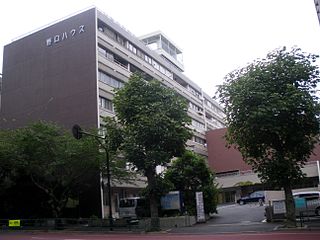Lists of schools in Tokyo include:
Note that multi-level schools are on at least two of these lists.

Shinjuku is a special ward in Tokyo, Japan. It is a major commercial and administrative centre, housing the northern half of the busiest railway station in the world and the Tokyo Metropolitan Government Building, the administration centre for the government of Tokyo. As of 2018, the ward has an estimated population of 346,235, and a population density of 18,232 people per km2. The total area is 18.23 km2. Since the end of the Second World War, Shinjuku has been a major secondary center of Tokyo (fukutoshin), rivaling to the original city center in Marunouchi and Ginza. It literally means "New Inn Ward".

Shibuya is a special ward in Tokyo, Japan. As a major commercial and finance center, it houses two of the busiest railway stations in the world, Shinjuku Station and Shibuya Station.

Nakano is a special ward in Tokyo, Japan. The English translation of its Japanese self-designation is Nakano City.

Toshima is a special ward in Tokyo, Japan. It is one of the eight central wards of the Tokyo Metropolitan area. Located in the northern area of Tokyo, Toshima is bordered by the wards of Nerima, Itabashi, and Kita in the north and Nakano, Shinjuku, and Bunkyo in the south.

Ikebukuro is a commercial and entertainment district in Toshima, Tokyo, Japan. Toshima ward offices, Ikebukuro station, and several shops, restaurants, and enormous department stores are located within city limits. It is considered the second largest adult entertainment district in Tokyo.

Kyōbashi (京橋) is a neighborhood east of Tokyo Station in Chūō, Tokyo, Japan. It is one of the city's oldest commercial districts, although it has since been eclipsed by Ginza to the south and Nihonbashi to the north. Kyobashi, together with Nihonbashi and Kanda, is the core of Shitamachi, the original downtown center of Edo-Tokyo, before the rise of newer secondary centers such as Shinjuku and Shibuya.

Shinjuku Ni-chōme (新宿二丁目), referred to colloquially as Ni-chōme or simply Nichō, is Area 2 in the Shinjuku District of the Shinjuku Special Ward of Tokyo, Japan. With Tokyo home to 13 million people, and Shinjuku known as the noisiest and most crowded of its 23 special wards, Ni-chōme further distinguishes itself as Tokyo's hub of gay subculture, housing the world's highest concentration of gay bars.

Kabukichō is an entertainment district in Shinjuku, Tokyo, Japan. Kabuki-chō is the location of many host and hostess clubs, love hotels, shops, restaurants, and nightclubs, and is often called the "Sleepless Town". Shinjuku Golden Gai, famous for its plethora of small bars, is part of Kabuki-cho.

Nihonbashi (日本橋) is a business district of Chūō, Tokyo, Japan which grew up around the bridge of the same name which has linked two sides of the Nihonbashi River at this site since the 17th century. The first wooden bridge was completed in 1603. The current bridge, designed by Tsumaki Yorinaka and constructed of stone on a steel frame, dates from 1911. The district covers a large area to the north and east of the bridge, reaching Akihabara to the north and the Sumida River to the east. Ōtemachi is to the west and Yaesu and Kyobashi to the south.
The Tokyo Metropolitan Government Board of Education is the board of education in Tokyo, Japan. The board directly manages all of the public high schools in all 23 special wards, the Western Tokyo, and all islands under Tokyo's jurisdiction.

Tokyo Metropolitan Shinjuku Yamabuki High School is located in Yamabuki-cho, Shinjuku, Tokyo, Japan. Shinjuku Yamabuki has Japan's most famous no class credit system and Information Technology course of high school. Shinjuku Yamabuki is operated by the Tokyo Metropolitan Government Board of Education.

Takanawa (高輪) is a neighborhood in Minato, Tokyo, Japan.

Yoyogi (代々木) is a neighbourhood in the northern part of Shibuya, Tokyo, Japan.

Kudankita (九段北) is a district of Chiyoda, Tokyo, Japan, consisting of four chōme. It was a part of the former ward of Kōjimachi. As of March 1, 2007, its population is 1,404. Kudankita is a luxury and prestigious residential and business zone.

Honmachi (本町) is a residential district of Shibuya, Tokyo, Japan.

Toyama (戸山) is a district of Shinjuku, Tokyo, Japan. It is known for Toyama Heights, one of the first and largest danchi complexes in Tokyo for low-income households.

Daikyōchō is a district of Shinjuku, Tokyo, Japan. It is a single town name that does not have any districts or sub-sections. Thus, no residential addressing system has been implemented and the postal code is 160-0015.

Shinanomachi is a district of Shinjuku, Tokyo, Japan. It is a single town name that does not have a "chome". Thus, no residential addressing system has been implemented and the postal code is 160-0016.

Tokyo Metropolitan Toyama High School is a public day school run by the Tokyo Metropolitan Government. The campus is located in Toyama 3-chome, Shinjuku-ku, Tokyo.